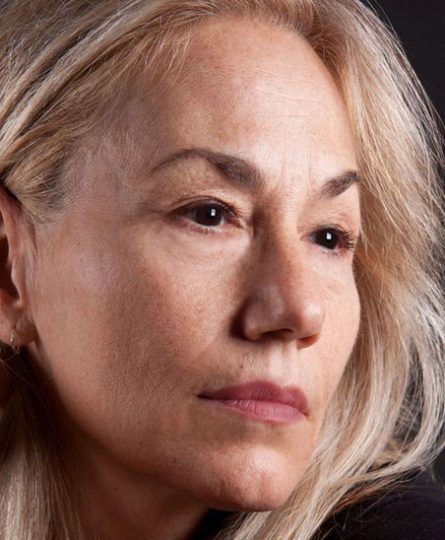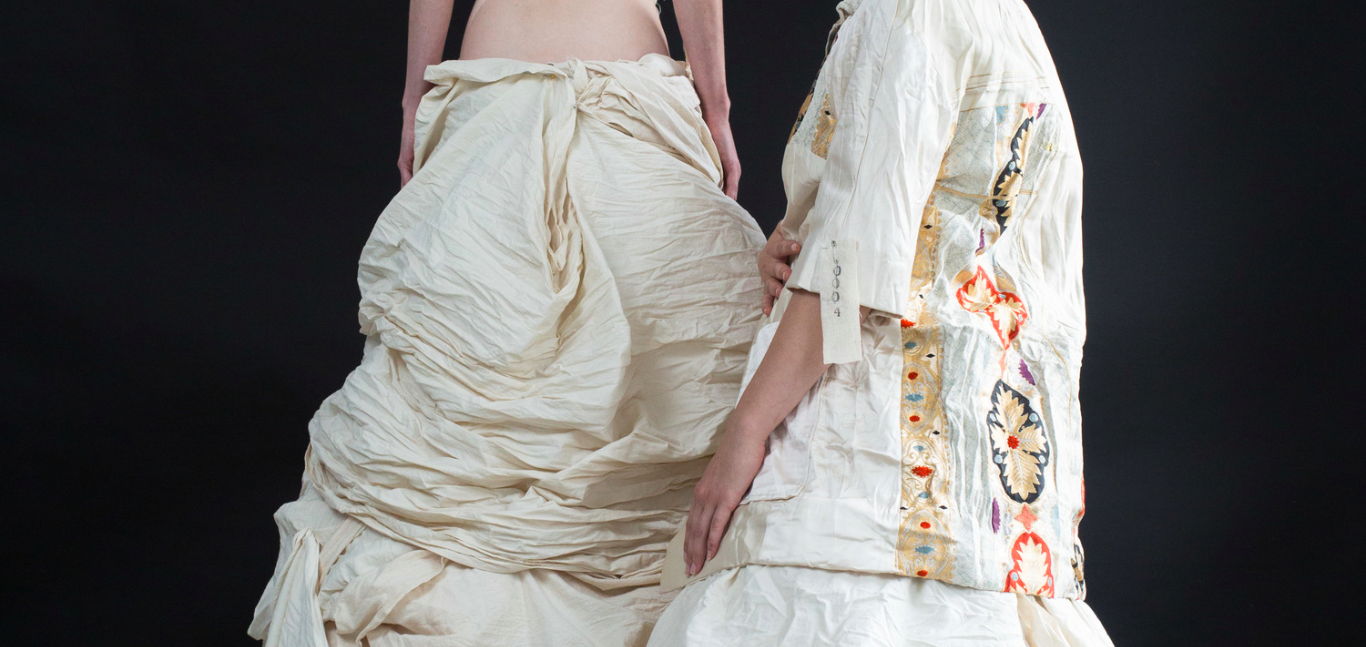
- What is your name:
I am karen glass.
- What is your occupation?
I am a fashion artist and entrepreneur.
- What was your favorite green memory growing up?
I was born in Youngstown Ohio, in the Mahoning Valley- used to be called the steel valley. The city alone produced 1/5 of the entire nations steel at the time- this was a factoid from my 9th grade geography book.
Not exactly filled with green memories. That said, my italian grandfather had a vegetable garden and a fruit orchard. This touched me then and still does when I think of it. He used everything. I mean everything. If there was house paint left over, it became the fresh coat of paint for my grandmothers ironing board, as well as their steamer trunk. My grandparents were especially disciplined about food waste.
- What was the inspiration for Zero Waste and core purpose?
Not as much an inspiration as is a culmination of life events, the zerø waste aspect of this work is about balancing transgression. I have been accountable to make millions of pieces of clothing in my life time. Many of them are now consumer waste, in landfills releasing methane gas, in households as dead apparel (you own it, but do nothing with it) in 2nd hand stores having lost their aesthetic appeal, or on a barge somewhere going to another country to manage. I began seeing clothes I had been accountable to make in situ, at the same time I was developing an organic farm in florida with my ex husband. organic farming is inherently a ø process. I often thought back to my grandparents in the days that we first started planting.
- Where do you see the future for sustainable fashion?
I read yesterday in a WGSN report that sustainable fashion is currently the largest growing retail sector.
currently 19% growth in 1 year. I want to believe this and I can see this shift in the next 2 generations of consumers. sustainability is a key value shift from boomers to millenials and into gen Z, also including are early adopter boomers. The mindset is to be informed, to know where your consumables come from, of what and how they are made, this is the power of individual/collective action, the people mold the process through civil disobedience. Don’t buy what you don’t know or can assign value to and it will stop being made with negative impact.
- What are the most rewarding and challenging part of your job?
Rewarding? The work, I love making beautiful exquisite clothes and helping people (especially women) heal and learn. I live for this only right now. Sustainable process and product is part of this.
- What is one environmental change you vow to make this year?
I don’t vow. I don’t put time parameters to resolution. I believe in process and practice. My commitment to environmental (and social) changes is on going. It is a discipline that is fully integrated into my life and into my work.
- Can you tell us more about the philanthropic component of Zero Waste?
Ø partners with beloved atlanta http://www.belovedatlanta.org and soon to be with out of darkness https://outofdarkness.org, to rehabilitate victimized women. Beloved is a 2 year rehabilitation program with housing, counsel, case management and one to one care. The Ø life work project is a commitment to providing advocacy for their mission and work development with rehabilitation to beloved graduates. Beloved candidates work as apprentices with in an 18 month program with Ø and then can either stay with the company or use their work development time as reference and work experience.
- If there was one industry/product that you could make more eco friendly, what would it be?
Textiles and apparel first and foremost! Then it would be technology hardware. This scares me. Kind of terminator like scary. All kidding aside. I don’t know what happens to techno waste. Another one is cyber waste, don’t know what happens to this either. Is cyber space infinite and can we dump as much information data into as we are continuing to do so with out harm? These are things i think about.
- What’s next for Zero Waste?
Next? Our big push currently is to push awareness of our brand and purpose, we want to inspire changes.
We need financing and with this comes our retail stores. Regardless of the news feeds about dying retail, I believe it is the venue as we know that is dying, not the experience. It is in our nature to crave tactile experience. This will never leave us. Our retail experience is a gallery/museum/store in one venue, you just don’t run in and pick up a piece, you learn the provenance of how things are made, what purpose they serve, and what value one of our pieces could add to your life experience, our work has and lends itself to heritage. Pieces that are kept for years or traded with value.
- What’s your favorite book?
The Count Monte Cristo. I have read it 5 times, in several different additions, included the little know sequel “edmond dantés’ in old english. The story is beautiful and perfect and enchanted me from the very first time I read it.
But then there is “eastern body, western mind” that has such a great voice for contemporary spirituality.
- Where do you turn for your news?
For creative intelligence I look to ellen sideri ESP trendlab in nyc, and on line I look to see what li edelkoort is doing.
For world affairs I listen to PBS when i drive sometimes, I read the huffington post, aljazeera, the real news, the guardian. About NYC I still read the village voice, for fashion and apparel still sometimes WWD (womenswear daily), but their format and content is a bit main stream for me. Really I look for emerging news or intelligence that shapes culture. This is what i love.
- Where on the green scale do you fall?
Personally I live and work zerøwaste in food and in home and clothes textiles, can’t say I could quantify this with a number though, nor am I fanatical about it. Sometimes I have no choice but to buy packaged food like greens in clam shells or wine in a bottle. I have bought less than 10 articles of clothing and home textiles in the past 6 years.
I look in 2nd hand stores first for textiles and apparel. If I buy new it means it will be with me for decades. I have shoes like that. I buy with knowledge and purpose.
- Do you lead a vegan lifestyle?
When I lived in south west Florida I ate fish often and only the produce from our farm, very little grain with local dairy when possible. I knew a lot of the fishermen who caught the fish and was in awe of the respect they had for the waters and the life within them around the islands there. i saw eating fish as part of our eco-life cycle. Actually we used crab trash in our soil mix. My diet is very clean. I eat a lot of greens, mostly fresh foods. I will move in and out of vegan. But I watched “scary dairy” and it broke my heart. I immediately stopped using any dairy in my coffee, I am working my way through morning yogurt alternatives as well as cheese alternatives. I don’t particularly care for processed vegan cheese. They may be dairy free but the nutritional value is low in all processed foods. I have to find the suitable alternative food product before i switch over completely.
- Who would you want to have a conversation with past or present?
I would like to have a conversation now with my father. He died when I was 18. He contributed to the formation of my spirit and my intellect. He first told me about meditation and taught me the different ways humans love, and bought me my 2nd favorite book “papillon” by henri charrière.
- Talk to us about the Goat Farms Art Center and how it has inspired your brand?
Coming to the farm was serendipitous. I found it by being in the hood. It had a personal draw for me. I could see how a new way of working and making was emerging here. The goat farm, by design and by organic happenstance is a contemporary model for social and economic development. For me it is essentially the integration of life and work in aesthetic and in practice. The fine and high art crafters have a great sense of personal investment in their work. this is contemporary provenance for me. they impart value into what they do. The aesthetic here imparts contextual value to the aesthetic of øzwkg, we can at times influence each others work, we certainly do in process. especially the artists that work in found object art or the fine crafters that work in zerø waste process. It is so much about process driving aesthetic, you acquire the discipline of creation from what is available, and then from what’s left over, you then elevate that waste to art.
- How does fast fashion impact the environment?
Whew 5 weeks average fast fashion wardrobe life cycle. I heard this said in the movie ‘the true cost’, I believe this, and I have witnessed it. Textile waste occupies 5% of landfill according to the council for textile recycling. That said only 15% of all textile waste is recycled. Fast fashion is the greatest product volume of global apparel manufacturing, it also uses the greatest amount of synthetic non biodegradable fibers, produces the greatest carbon foot print with the global trafficking necessary for fast/mass supply chain economies, you gotta figure, to move tons and tons of clothes, takes a lot of fossil fuel by land, by sea and by air.
- What do you want your personal legacy to be?
That I served others well, and perhaps created a sustainable model to live and work by.
 Food
Food Farmers
Farmers Sustainable Living
Sustainable Living Living Planet
Living Planet News
News